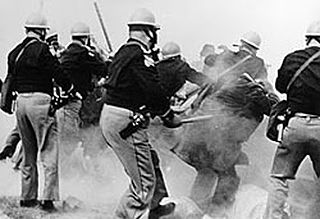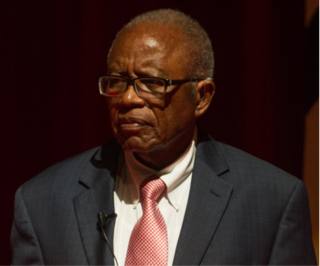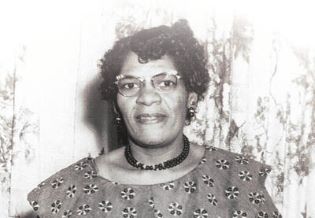Related Research Articles

Claudette Colvin is an American pioneer of the 1950s civil rights movement and retired nurse aide. On March 2, 1955, she was arrested at the age of 15 in Montgomery, Alabama, for refusing to give up her seat to a white woman on a crowded, segregated bus. This occurred nine months before the more widely known incident in which Rosa Parks, secretary of the local chapter of the National Association for the Advancement of Colored People (NAACP), helped spark the 1955 Montgomery bus boycott.

The Montgomery bus boycott was a political and social protest campaign against the policy of racial segregation on the public transit system of Montgomery, Alabama. It was a foundational event in the civil rights movement in the United States. The campaign lasted from December 5, 1955—the Monday after Rosa Parks, an African-American woman, was arrested for her refusal to surrender her seat to a white person—to December 20, 1956, when the federal ruling Browder v. Gayle took effect, and led to a United States Supreme Court decision that declared the Alabama and Montgomery laws that segregated buses were unconstitutional.

The Southern Christian Leadership Conference (SCLC) is an African-American civil rights organization based in Atlanta, Georgia. SCLC is closely associated with its first president, Martin Luther King Jr., who had a large role in the American civil rights movement.

The Selma to Montgomery marches were three protest marches, held in 1965, along the 54-mile (87 km) highway from Selma, Alabama, to the state capital of Montgomery. The marches were organized by nonviolent activists to demonstrate the desire of African-American citizens to exercise their constitutional right to vote, in defiance of segregationist repression; they were part of a broader voting rights movement underway in Selma and throughout the American South. By highlighting racial injustice, they contributed to passage that year of the Voting Rights Act, a landmark federal achievement of the civil rights movement.

Edgar Daniel Nixon, known as E. D. Nixon, was an American civil rights leader and union organizer in Alabama who played a crucial role in organizing the landmark Montgomery bus boycott there in 1955. The boycott highlighted the issues of segregation in the South, was upheld for more than a year by black residents, and nearly brought the city-owned bus system to bankruptcy. It ended in December 1956, after the United States Supreme Court ruled in the related case, Browder v. Gayle (1956), that the local and state laws were unconstitutional, and ordered the state to end bus segregation.
The Montgomery Improvement Association (MIA) was formed on December 5, 1955 by black ministers and community leaders in Montgomery, Alabama. Under the leadership of Ralph Abernathy, Martin Luther King Jr. and Edgar Nixon, the MIA was instrumental in guiding the Montgomery bus boycott, a successful campaign that focused national attention on racial segregation in the South and catapulted King into the national spotlight.
Browder v. Gayle, 142 F. Supp. 707 (1956), was a case heard before a three-judge panel of the United States District Court for the Middle District of Alabama on Montgomery and Alabama state bus segregation laws. The panel consisted of Middle District of Alabama Judge Frank Minis Johnson, Northern District of Alabama Judge Seybourn Harris Lynne, and Fifth Circuit Court of Appeals Judge Richard Rives. The main plaintiffs in the case were Aurelia Browder, Claudette Colvin, Susie McDonald, and Mary Louise Smith. Jeanetta Reese had originally been a plaintiff in the case, but intimidation by segregationists caused her to withdraw in February. She falsely claimed she had not agreed to the lawsuit, which led to an unsuccessful attempt to disbar Fred Gray for supposedly improperly representing her.

Fred David Gray is an American civil rights attorney, preacher, activist, and state legislator from Alabama. He handled many prominent civil rights cases, such as Browder v. Gayle, and was elected to the Alabama House of Representatives in 1970, along with Thomas Reed, both from Tuskegee. They were the first black state legislators in Alabama in the 20th century. He served as the president of the National Bar Association in 1985, and in 2001 was elected as the first African-American President of the Alabama State Bar.
The Women's Political Council (WPC), founded in Montgomery, Alabama, was an organization that formed in 1946 that was an early force active in the civil rights movement that was formed to address the racial issues in the city. Members included Mary Fair Burks, Jo Ann Robinson, Maude Ballou, Irene West, Thelma Glass, and Euretta Adair.

Robert Sylvester Graetz Jr. was a Lutheran clergyman who, as the white pastor of a black congregation in Montgomery, Alabama, openly supported the Montgomery bus boycott, a landmark event of the civil rights movement.

Johnnie Rebecca Daniels Carr was a leader in the Civil Rights Movement in the United States from 1955 until her death.

Aurelia Shines Browder Coleman was an African-American civil rights activist in Montgomery, Alabama. In April 1955, almost eight months before the arrest of Rosa Parks and a month after the arrest of Claudette Colvin, she was arrested for refusing to give up her bus seat to a white rider.
The Southern Courier was a weekly newspaper published in Montgomery, Alabama, from 1965 to 1968, during the Civil Rights Movement. As one of a few newspapers to cover the movement with an emphasis on African-American communities in the South, it provided its readership with a comprehensive view of race relations and community and is considered an important source for historians.
This is a timeline of the civil rights movement in the United States, a nonviolent mid-20th century freedom movement to gain legal equality and the enforcement of constitutional rights for people of color. The goals of the movement included securing equal protection under the law, ending legally institutionalized racial discrimination, and gaining equal access to public facilities, education reform, fair housing, and the ability to vote.
The Committee for Equal Justice was an organization founded with the goal of assisting black women reclaim their bodies against sexual violence and interracial rape. Recy Taylor and Rosa Parks founded the committee in 1944 after six white men kidnapped and raped Taylor, an African-American woman, as she left her Abbeville, Alabama church. Taylor's case garnered heavy media coverage. With this attention came national support, which led to what the Chicago Defender called the "strongest campaign for equal justice to be seen in a decade." Committee members formed eighteen chapters across the United States, and included such figures as WEB DuBois, Mary Church Terrell, Oscar Hammerstein II, John Sengstacke and Langston Hughes, among others.

Joseph W. Ellwanger Jr. is a Lutheran pastor, author, and civil rights activist. He was a key figure in the Civil Rights Movement in Birmingham, Alabama, and the only white religious leader included in strategy meetings with Martin Luther King Jr.
Joel Elvin Atkins was the Senior Pastor of Zion Hill Missionary Baptist Church for 42 years until his death in 1997. He was a church leader and local president of the Winter Haven, Florida chapter of the NAACP before becoming the NAACP's statewide leader. He was an organizer on integration and civil rights efforts in the state.

Jean Graetz, born Jean Ellis, was an American civil rights activist. She and her clergyman husband Robert Graetz were active white supporters of the Montgomery bus boycott in 1955.
Richard Henry Harris, Jr. was a prominent civil rights leader and pharmacist. A personal friend, neighbor and collaborator of Dr Martin Luther King Jr. in Montgomery, Alabama, Harris was instrumental in three of the most seminal protests of the U.S. civil rights movement: the Freedom Riders, the Montgomery Bus Boycott and the Selma to Montgomery marches. Harris's home, best known as the famed “Richard Harris House”, was Montgomery, Alabama’s central command center and safe haven for beaten and bloodied Freedom Riders as they traveled to Jackson, Mississippi amidst physically violent racial rioters, National Guard protection, and Alabama segregationist authorities’ call for martial law.
Booker T. Washington School was in Montgomery, Alabama. It was at 632 South Union Street and succeeded Swayne College which closed in 1937. The Swayne school building was demolished in 1948 to make way for Booker T. Washington High School, Montgomery's first high school for African American students.
References
- ↑ Humanities, National Endowment for the. "Alabama tribune" – via chroniclingamerica.loc.gov.
- ↑ "Alabama Tribune Archive". Newspapers.com.
- ↑ "Alabama Tribune 13 Sep 1946, page 1". Newspapers.com.
- ↑ "Alabama Tribune from Montgomery, Alabama". Newspapers.com. December 16, 1955.
- ↑ "Box 19 - Binder 08: June 1956, 1956 June 1 | Levi Watkins Learning Center". archivesspace.alasu.edu.
- ↑ "Statement Upon Return to Montgomery | The Martin Luther King, Jr. Research and Education Institute". kinginstitute.stanford.edu.
- ↑ Thornton, J. Mills (September 25, 2002). "Dividing Lines: Municipal Politics and the Struggle for Civil Rights in Montgomery, Birmingham, and Selma". University of Alabama Press – via Google Books.
- ↑ Niedermeier, Silvan (September 17, 2019). "The Color of the Third Degree: Racism, Police Torture, and Civil Rights in the American South, 1930–1955". UNC Press Books – via Google Books.
- ↑ McGuire, Danielle L. (2011). At the Dark End of the Street: Black Women, Rape, and Resistance--A New History of the Civil Rights Movement from Rosa Parks to the Rise of Black Power. Knopf Doubleday Publishing Group. ISBN 9780307389244.
- ↑ Jenkins, William; Noble, G. M. (January 26, 1900). "The Montgomery Enterprise. (Montgomery, Ala.), Vol. 2, No. 1, Ed. 1 Friday, January 26, 1900". The Portal to Texas History.
- ↑ "Montgomery-Tuskegee Times".